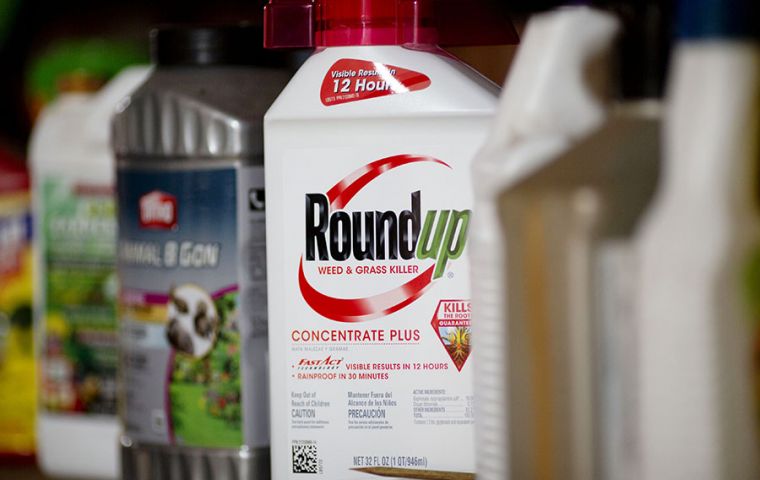MercoPress. South Atlantic News Agency
US Environment agency reaffirms glyphosate does not cause cancer; contradicts California court verdict
 US said in a friend of the court brief that glyphosate is not a carcinogen and as a result a warning on the label was not required as California state law demands.
US said in a friend of the court brief that glyphosate is not a carcinogen and as a result a warning on the label was not required as California state law demands.  Farmers spray glyphosate, the most widely used herbicide in U.S. agriculture, on fields of soybeans and other crops that are genetically engineered to resist it
Farmers spray glyphosate, the most widely used herbicide in U.S. agriculture, on fields of soybeans and other crops that are genetically engineered to resist it The U.S. Environmental Protection Agency and the Justice Department said a federal appeals court should reverse a lower court verdict finding Bayer AG liable in the case of a California man who blamed its Roundup weed killer for his cancer.
The government said in a friend of the court brief filed on Friday that glyphosate, the weed killer’s active ingredient, is not a carcinogen and as a result a warning on the label was not required as California state law demands.
The backing by the EPA and Justice Department comes days after Bayer asked a U.S. federal appeals court to throw out a US$ 25 million judgment it was ordered to pay Edwin Hardeman. Bayer had denied its Roundup weed killer causes cancer.
In April, the EPA reaffirmed that glyphosate does not cause cancer.
Farmers spray glyphosate, the most widely used herbicide in U.S. agriculture, on fields of soybeans and other crops that are genetically engineered to resist it. Roundup is also used by consumers on lawns, golf courses and elsewhere.
Hardeman’s lawyers previously accused Roundup maker Monsanto, which Bayer acquired last year in a US$ 63 billion deal, of having failed to warn consumers about the herbicide’s cancer risk. Bayer stock has lost about 23% in value since the first Roundup verdict for plaintiffs in August 2018.
Bayer argued it would be impossible to comply with the Hardeman verdict, a lawsuit brought under state law, because any warning label would be in conflict with guidance from a federal agency.
The EPA and Justice Department agreed in their Friday filing. “It is unlawful for manufacturers and sellers to make claims on their labels that differ from what EPA approves,” the U.S. government said.




Top Comments
Disclaimer & comment rulesCommenting for this story is now closed.
If you have a Facebook account, become a fan and comment on our Facebook Page!